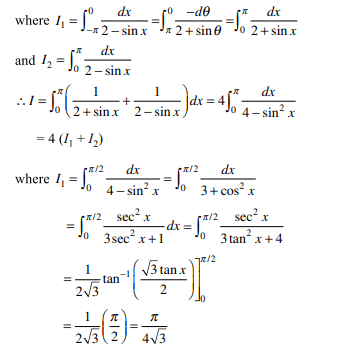1.For a > 0, let \[I\left(a\right)=\int_{0}^{a} \frac{dx}{1+e^{a^{2}-2ax}}\]
and let \[0<\theta<\pi/2\] , then
a) \[I'\left(a\right)=ln \sqrt{e}\]
b) \[I\left(\sin\theta\right)+I \left(\cos\theta\right) \leq\sin \left(\pi/4\right)\]
c) \[I\left(\sin^{2}\theta\right)+I \left(\cos^{2}\theta\right) =\frac{1}{2}\]
d) All of the Above
Explanation:


2. Let \[I=\int_{-1}^{1} \left(\frac{1+2018^{\mid x\mid}}{1+2017^{x}}+\frac{1+2017^{\mid x\mid}}{1+2018^{x}}\right)dx\]
equals
a) I > 2
b) I < 4017
c) I > 4
d) All of the Above
Explanation:


3.The value of the integral \[I=\int_{0}^{\pi/4}\frac{dx}{a\cos ^{2} x+b\sin^{2} x}\]
is
a) \[\frac{1}{\sqrt{ab}}\tan^{-1}\sqrt{\frac{b}{a}}\left(a>0,b>0\right)\]
b) \[\frac{1}{\sqrt{ab}}\tan^{-1}\sqrt{\frac{b}{a}}\left(a<0,b<0\right)\]
c) \[\frac{\pi}{4a}\left(a=b\right)\]
d) All of the Above
Explanation:


4. If \[I_{1}=\int_{1}^{\pi} \frac{dx}{e^{3x}+\sin^{3} x}\]
and
\[I_{2}=\int_{1}^{\pi} \frac{dx}{\left(e^{x}+\sin x\right)^{3}}\] then
a) \[I_{1}\leq4I_{2}\]
b) \[I_{1}>I_{2}\]
c) \[I_{1}\leq6I_{2}\]
d) All of the Above
Explanation:
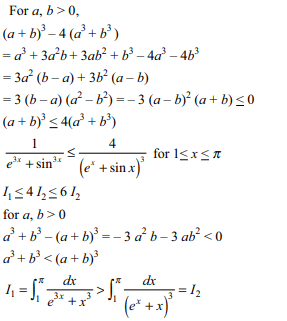
5. For 0 < t < 1, let \[F_{n}\left(t\right)=\frac{1}{2t} \int_{0}^{1} \mid x^{n}-t\mid dx+\frac{1}{2}\]
and let \[a_{n}\] be the least value of
\[F_{n}\left(t\right)\] for 0 < t < 1, then
a) \[F_{n}\left(t\right)=\frac{1}{\left(n+1\right)}\left[\frac{1}{t}+2nt^{1/n}\right]\]
b) \[a_{n}=2^{-1/\left(n+1\right)}\]
c) \[\lim_{n \rightarrow \infty}a_{n}a_{n+1}....a_{2n-1}=2^{-\log 2}\]
d) All of the Above
Explanation:




6. For \[a\geq 1\] , let \[I\left(a\right)=\int_{-1/a}^{1/a} \left(2x^{6}+2x^{4}+3\right)\cos^{-1}\left(ax\right)dx\]
then
a) \[I\left(a\right)\leq\frac{129\pi}{35 a}\]
b)\[I\left(a\right)=\pi\left(\frac{2}{7a^{7}}+\frac{2}{5a^{5}}+\frac{3}{a}\right)\]
c) I(a) is independent of a
d) Both a and b
Explanation:
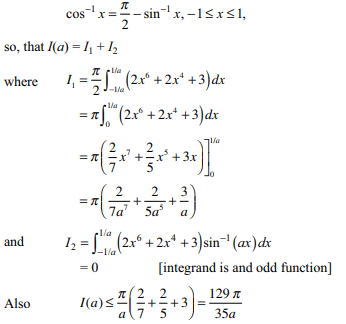
7. Let f be a real value function such that \[f\left(\frac{1}{x}\right)=f\left(x\right)\forall x\neq0\]
Let a > 0 and \[I=\int_{\sqrt{2}-1}^{\sqrt{2}+1} \frac{dx}{\left(1+x^{2}\right)\left(1+a^{f\left(x\right)}\right)}\]
a) independent of a
b) independent of function f
c) \[\tan^{-1}\left(\sqrt{2}+1\right)-I=\pi/4\]
d) All of the Above
Explanation:


8. Let \[a\epsilon \left(0,\pi/2\right)\] , b \[\geq\] 1, m, \[n\epsilon N\] and let f,
g, h, k: [–a, a] \[\rightarrow R\]
be four continuous functions such that
f(–x) = –f(x), g(–x) = –g(x), h(–x) = h(x), k(–x) = k(x), and
let \[I=\int_{-a}^{a}\frac{f\left(x\right)+g\left(x\right)}{\left(b-\cos x\right)^{m}h\left(x\right)+k\left(x\right)\sin^{2n}x}dx\]
a) I is independent of a
b) I is independent of f and g
c) I is independent of h and k
d) All of the Above
Explanation:

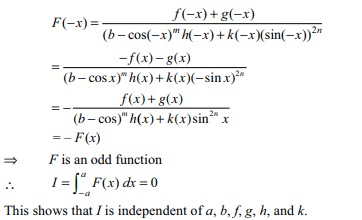
9. Let \[f\left(x\right)=\frac{\sin x-2\log\left(\frac{1-\sin x}{\cos x}\right)}{\left(1+\cos2x\right)\sqrt{\log\left(\frac{1+\sin x}{\cos x}\right)}},0\leq x\leq\frac{\pi}{4}\]
and
\[I=\int_{0}^{\pi/4} f\left(x\right)dx\] then
a) \[I=\log\left(\sqrt{2}+1\right)\]
b) \[I=\sqrt{\log\left(\sqrt{2}+1\right)}\]
c) \[I=\sqrt{\log\cot\left(\pi/8\right)}\]
d) Both b and c
Explanation:

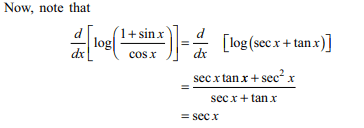
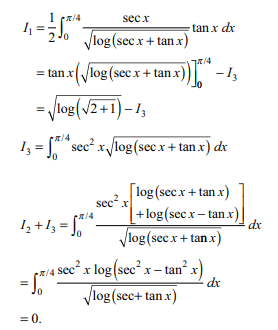
10. If \[I=\int_{-\pi}^{\pi} \frac{dx}{2-\sin x}\]
then I is equal to
a) \[\frac{2\pi}{3}\]
b) \[\frac{2\pi}{\sqrt{3}}\]
c) \[\frac{\pi}{\sqrt{3}}\]
d) \[\frac{\pi}{3}\]
Explanation:

